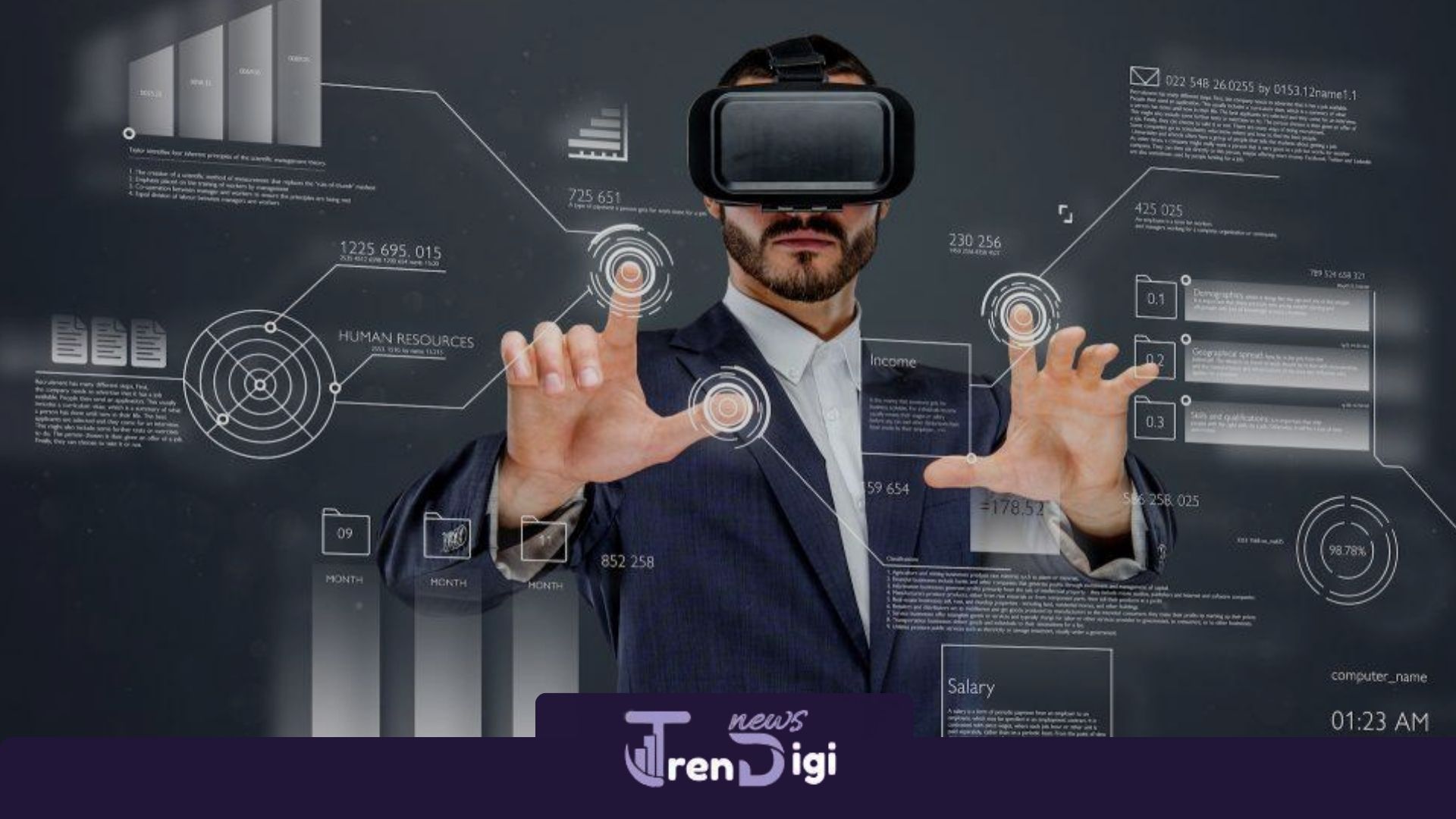The Rise of the Metaverse: What Businesses Need to Know
The Rise of the Metaverse: What Businesses Need to Know highlights how virtual environments are transforming how companies operate, communicate, and create value. The metaverse is not a distant futuristic concept; it is an evolving network of immersive digital worlds driven by advanced technologies like virtual reality, augmented reality, blockchain, and artificial intelligence. Businesses are exploring new ways to engage customers, collaborate globally, and generate revenue in this growing digital universe. This article explains the key technologies, emerging opportunities, challenges, and strategic actions companies must take to stay competitive in the age of the metaverse. In Trendiginews , we have covered this topic thoroughly.
.
Understanding The Rise of the Metaverse
The metaverse is an interconnected virtual space where people use avatars to interact, socialize, shop, learn, and work. It blends physical and digital realities, allowing users to move between different immersive environments. Businesses recognize that this shift is more than a technological trend; it represents a new stage of digital transformation.
For companies, the metaverse provides an opportunity to reimagine customer experiences, streamline operations, and create new markets. By merging digital ownership, immersive design, and social interaction, it enables a new form of online presence that is both experiential and transactional. Understanding the rise of the metaverse means understanding how these new digital experiences influence behavior, brand perception, and business growth.
.
Technological Foundations

Extended Reality and Immersive Interfaces
Extended reality combines virtual, augmented, and mixed reality technologies to build interactive digital experiences. Businesses use these tools to train employees, simulate environments, and engage customers in creative ways. Headsets, sensors, and holographic displays allow users to experience products, services, and collaboration spaces as if they were real.
Companies in various industries are using immersive interfaces to reduce costs, improve efficiency, and increase engagement. For example, manufacturers use virtual simulations for equipment training, while retailers offer virtual showrooms that mirror real-world stores. As hardware becomes more affordable and accessible, extended reality will play a central role in metaverse adoption.
Artificial Intelligence and Smart Automation
Artificial intelligence powers the metaverse by managing data, enabling realistic avatars, and supporting automated interactions. AI algorithms generate lifelike environments, translate languages in real time, and analyze user behavior to personalize experiences. For businesses, AI helps deliver consistent and intelligent customer support, predictive marketing, and autonomous content creation.
AI also ensures scalability. As virtual worlds grow, automated systems manage thousands of simultaneous interactions, maintaining performance and security. Smart automation within the metaverse allows companies to operate efficiently without needing large physical infrastructures. How Home Robots Are Transforming Our Digital Lifestyle
Blockchain and Digital Ownership
Blockchain technology secures transactions, verifies digital identities, and enables asset ownership within the metaverse. Through tokenization, users can buy, sell, and trade digital goods with full transparency. Businesses can create secure marketplaces for virtual products, event tickets, and intellectual property.
Blockchain ensures trust, an essential factor in digital economies. With verifiable ownership records, users gain confidence in virtual transactions. For businesses, this means safer and more accountable engagement models that protect both brand and customer interests.
.
Emerging Business Opportunities
Virtual Real Estate and Branded Environments
Virtual real estate represents one of the fastest-growing areas in the metaverse. Companies buy or lease digital spaces to host stores, events, or branded experiences. A well-designed virtual space allows brands to engage users through interactive storytelling, product launches, and immersive events.
Digital environments provide creative freedom. Businesses can design virtual locations that express their identity without physical limitations. From fashion runways to conference halls, these spaces allow consumers to interact directly with brands in memorable ways.
Immersive Marketing and Consumer Engagement
The metaverse transforms marketing from passive observation to active participation. Instead of traditional advertisements, customers can experience brands through virtual demos, games, or live events. This form of engagement deepens emotional connection and increases brand loyalty.
For example, instead of watching a product video, users can explore and test items virtually. Immersive marketing creates stronger recall and measurable results, making it one of the most promising frontiers for digital advertising. Companies that integrate storytelling with interactive experiences can stand out in a competitive digital landscape.
Remote Collaboration and Virtual Workspaces
The future of work increasingly involves virtual offices where employees collaborate through avatars and shared 3D spaces. These environments simulate real-world interactions, enabling teams across continents to brainstorm, design, and solve problems together.
Businesses benefit from reduced travel costs, faster decision-making, and enhanced creativity. Virtual workplaces also improve inclusivity, allowing employees from different locations to engage equally. As organizations adapt to hybrid work, metaverse-based offices will become a natural extension of corporate culture.
Virtual Events and Conferences
Metaverse-based events redefine networking and participation. Instead of watching presentations on a screen, attendees can move between virtual booths, interact with speakers, and engage in real-time discussions. For businesses, this reduces event costs while reaching global audiences.
Interactive features such as digital stages, customizable avatars, and 3D product showcases enhance participation. Companies hosting virtual trade shows or product launches can track engagement metrics instantly, allowing more data-driven decisions and improved post-event marketing.
.
Strategic Implementation

Aligning the Metaverse with Business Goals
Every company entering the metaverse must define a clear purpose. Adoption should align with existing business goals such as improving customer experience, increasing efficiency, or expanding into new markets. Blind experimentation without a clear strategy can waste resources.
Executives must evaluate where virtual environments create measurable value. For example, a fashion brand might use the metaverse for digital runway shows, while a logistics firm could build a virtual operations hub. When goals align with technology, the return on investment becomes sustainable.
Building Technical and Creative Capabilities
The metaverse requires both technical infrastructure and creative vision. Businesses need teams skilled in 3D design, virtual production, blockchain management, and immersive storytelling. Partnerships with experienced developers and digital artists accelerate progress.
Training is equally important. Employees should learn how to operate, present, and engage within virtual platforms. When organizations build internal expertise, they gain flexibility and control over how they evolve their metaverse presence.
Ensuring Privacy, Ethics, and User Safety
The metaverse introduces complex privacy and security challenges. Virtual interactions collect vast data about movement, speech, and behavior. Businesses must establish transparent data policies, safeguard user information, and follow ethical standards.
Strong cybersecurity frameworks prevent misuse and build trust. Companies should adopt encryption, identity verification, and content moderation systems that protect users. Maintaining ethical responsibility is crucial for long-term credibility in the metaverse.
.
Challenges Businesses Face During
Technical Barriers and Infrastructure Costs
While the metaverse offers endless potential, the technology required to sustain it remains complex and costly. Building large-scale immersive worlds demands high computing power, stable internet connections, and advanced graphics capabilities. Many businesses struggle with the financial and technical burden of maintaining these requirements.
Hardware devices such as VR headsets and motion sensors can be expensive and may require frequent updates. Companies must also invest in strong data centers and cloud infrastructure to support real-time interactions. Despite these costs, early adopters gain valuable experience and market leadership that often outweigh initial expenses.
Limited Interoperability Between Platforms
One of the biggest obstacles in the rise of the metaverse is the lack of interoperability. Virtual worlds currently operate as separate ecosystems, each with its own rules, assets, and currencies. This fragmentation restricts users and brands from moving digital goods or identities across platforms.
For businesses, this means creating content or assets for multiple systems instead of one unified network. As technology standards evolve, interoperability will improve, but at present, it remains a challenge that limits scalability and convenience. Companies must plan flexible strategies that adapt to multiple platforms while anticipating future integration.
Cybersecurity Threats and Data Protection
The metaverse collects extensive amounts of user data, including biometrics, voice, and behavioral patterns. These details create opportunities for personalization but also increase exposure to privacy risks. Businesses must prioritize strong cybersecurity frameworks to protect users and maintain brand reputation.
Cyberattacks, identity theft, and data breaches can damage trust instantly. Companies need continuous monitoring, multi-factor authentication, and clear data policies to safeguard user interactions. Maintaining secure environments ensures long-term engagement and prevents costly legal or reputational consequences.
Regulatory and Legal Uncertainty
Because the metaverse is still evolving, global laws around digital assets, intellectual property, and taxation remain unclear. Different countries interpret virtual transactions differently, creating confusion for international businesses. Companies must track emerging regulations to ensure compliance with evolving data, consumer, and financial laws.
Legal teams need to update contracts and policies for virtual engagements. This includes managing ownership rights of digital assets, protecting creative content, and ensuring that virtual advertising follows ethical and legal standards. Proactive governance helps businesses stay ahead of regulatory change.
Environmental and Ethical Considerations
The metaverse relies on high computing power, which increases energy consumption. Businesses must consider sustainability when building digital infrastructure. Using energy-efficient servers and green technologies reduces environmental impact.
Ethically, companies must also protect users from harmful or misleading content. Moderation systems and clear behavioral guidelines create a safe digital culture. A responsible approach strengthens brand image and demonstrates corporate integrity in a fast-changing digital world.
.
Industry-Specific Impacts

Retail and E-Commerce Transformation
Retailers use the metaverse to offer immersive shopping experiences where customers interact with products virtually before purchasing. Virtual stores allow shoppers to browse, try items through avatars, and make instant digital payments.
These experiences blend convenience with creativity, turning shopping into entertainment. Businesses gain access to valuable behavioral data and can personalize offers in real time. As virtual fashion and digital collectibles rise, retail brands must redefine product value to include both physical and digital versions.
Education and Training Evolution
Education institutions and corporate trainers use the metaverse to build interactive classrooms and training modules. Instead of reading instructions, learners engage in lifelike simulations. This approach improves knowledge retention and reduces training costs.
Businesses benefit from using immersive training for safety procedures, equipment handling, or leadership programs. The ability to replicate real scenarios in virtual form allows employees to practice and improve performance without risk. The rise of the metaverse is transforming professional development into a continuous, engaging experience.
Healthcare and Wellness Applications
The healthcare sector uses metaverse technology to support remote diagnostics, therapy sessions, and medical simulations. Doctors can examine 3D organ models, collaborate with specialists worldwide, and guide surgeries through virtual systems.
Mental health professionals host therapy sessions in calming virtual settings, offering patients privacy and comfort. For businesses in this field, the metaverse creates opportunities to expand services and deliver care across borders without geographical limits.
Real Estate and Architecture Innovation
Architects and property developers design and present projects in immersive environments, allowing clients to walk through buildings before construction begins. Real estate agencies host virtual tours that save time and increase engagement.
This transformation reduces costs associated with travel and physical model creation. By adopting metaverse visualization tools, businesses in real estate gain better decision-making accuracy and stronger customer satisfaction.
Entertainment, Media, and Sports
The entertainment industry leads metaverse adoption through concerts, films, and gaming experiences hosted entirely in virtual worlds. Audiences can attend live events, interact with performers, and collect digital memorabilia.
Sports franchises also explore metaverse engagement by offering virtual seats, interactive statistics, and exclusive digital content. These innovations expand audience reach and create new revenue streams. Businesses in media and entertainment must adapt quickly to remain relevant in this immersive future.
.
Future Trends in The Rise of the Metaverse
Integration of Artificial Intelligence and Personalized Worlds
AI will continue to shape the future of the metaverse. Intelligent systems will design personalized experiences that adapt to user behavior. Businesses will use predictive algorithms to deliver dynamic environments tailored to customer needs and preferences.
Virtual assistants powered by AI will guide users, provide real-time feedback, and manage complex interactions. The deeper integration of AI will create self-evolving metaverse worlds that feel natural, responsive, and emotionally engaging.
Growth of the Creator Economy
The metaverse empowers creators to design, build, and sell digital assets independently. Artists, developers, and influencers generate income through virtual products, experiences, and services. Businesses can collaborate with creators to produce authentic and innovative content that resonates with communities.
This new economy values creativity and participation. Companies that support and partner with independent creators will benefit from higher engagement and cultural relevance. The rise of the metaverse is transforming the traditional brand-consumer relationship into a shared creative partnership.
Expansion of Cross-Platform Collaboration
Future metaverse development will focus on connecting multiple platforms seamlessly. Businesses will interact across different digital worlds without losing identity or assets. This cross-platform approach will open larger markets and reduce entry barriers for new companies.
Shared standards and open protocols will support interoperability, making it easier for businesses to collaborate globally. As a result, digital trade and cross-border innovation will accelerate.
Enhanced Data Visualization and Analytics
As interactions move to immersive environments, data visualization will evolve beyond dashboards. Businesses will analyze information within 3D spaces, observing patterns through spatial representations.
This transformation allows executives to visualize trends and decisions interactively. Advanced analytics within the metaverse will improve forecasting, performance measurement, and strategic planning. Businesses that adopt these tools early will gain stronger competitive intelligence.
The Rise of Virtual Governance and Digital Identity
Digital identity will become a foundation of metaverse interactions. Secure identity verification will allow users to move safely between platforms while maintaining control of their data. Businesses will rely on decentralized systems to authenticate transactions and protect intellectual property.
Virtual governance models will manage rights, responsibilities, and digital ethics. As these systems mature, businesses will operate in a more organized and transparent virtual economy.
.
Preparing for The Future What Businesses Need to Know

Businesses that thrive in the metaverse era will combine technological innovation with strategic foresight. The first step involves understanding customer expectations in immersive spaces. Companies must experiment while maintaining alignment with their brand values.
Building partnerships across technology, creative design, and marketing will accelerate progress. Collaboration helps share costs, expand expertise, and enhance innovation. Continuous learning ensures that businesses remain adaptable as new tools and standards emerge.
Organizations must also focus on inclusivity. The metaverse should be accessible to users of all backgrounds and abilities. Designing diverse avatars, user-friendly interfaces, and multilingual support ensures broad participation and positive brand reputation.
Long-term success depends on balancing excitement with discipline. Businesses should pilot small projects, measure results, and scale proven strategies. By combining creativity with analytical insight, they can shape the metaverse instead of merely reacting to it.
.
Conclusion about The Rise of the Metaverse and Its Lasting Impact on Business
The Rise of the Metaverse: What Businesses Need to Know reflects one of the most important digital shifts of the century. The metaverse merges physical and virtual realities to create limitless opportunities for innovation, collaboration, and growth. Businesses that understand its technologies, anticipate its challenges, and act with purpose will lead this transformation.
Every industry — from retail and healthcare to education and entertainment — stands to benefit from immersive experiences and digital ownership models. The companies that embrace adaptability, ethical responsibility, and creativity will define the next generation of digital enterprise.
The rise of the metaverse is not a temporary trend. It represents a structural evolution in how people live, work, and connect. Businesses that prepare now will shape the future economy, establish lasting customer relationships, and build stronger global communities in this interconnected digital universe.




